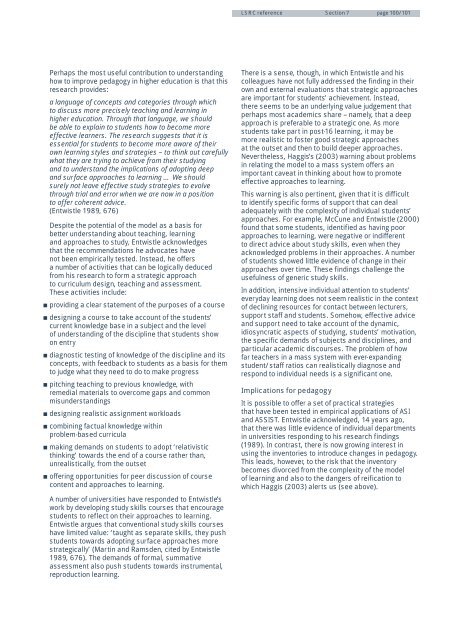learning-styles
learning-styles
learning-styles
You also want an ePaper? Increase the reach of your titles
YUMPU automatically turns print PDFs into web optimized ePapers that Google loves.
LSRC reference Section 7<br />
page 100/101<br />
Perhaps the most useful contribution to understanding<br />
how to improve pedagogy in higher education is that this<br />
research provides:<br />
a language of concepts and categories through which<br />
to discuss more precisely teaching and <strong>learning</strong> in<br />
higher education. Through that language, we should<br />
be able to explain to students how to become more<br />
effective learners. The research suggests that it is<br />
essential for students to become more aware of their<br />
own <strong>learning</strong> <strong>styles</strong> and strategies – to think out carefully<br />
what they are trying to achieve from their studying<br />
and to understand the implications of adopting deep<br />
and surface approaches to <strong>learning</strong> … We should<br />
surely not leave effective study strategies to evolve<br />
through trial and error when we are now in a position<br />
to offer coherent advice.<br />
(Entwistle 1989, 676)<br />
Despite the potential of the model as a basis for<br />
better understanding about teaching, <strong>learning</strong><br />
and approaches to study, Entwistle acknowledges<br />
that the recommendations he advocates have<br />
not been empirically tested. Instead, he offers<br />
a number of activities that can be logically deduced<br />
from his research to form a strategic approach<br />
to curriculum design, teaching and assessment.<br />
These activities include:<br />
providing a clear statement of the purposes of a course<br />
designing a course to take account of the students’<br />
current knowledge base in a subject and the level<br />
of understanding of the discipline that students show<br />
on entry<br />
diagnostic testing of knowledge of the discipline and its<br />
concepts, with feedback to students as a basis for them<br />
to judge what they need to do to make progress<br />
pitching teaching to previous knowledge, with<br />
remedial materials to overcome gaps and common<br />
misunderstandings<br />
designing realistic assignment workloads<br />
combining factual knowledge within<br />
problem-based curricula<br />
making demands on students to adopt ‘relativistic<br />
thinking’ towards the end of a course rather than,<br />
unrealistically, from the outset<br />
offering opportunities for peer discussion of course<br />
content and approaches to <strong>learning</strong>.<br />
A number of universities have responded to Entwistle’s<br />
work by developing study skills courses that encourage<br />
students to reflect on their approaches to <strong>learning</strong>.<br />
Entwistle argues that conventional study skills courses<br />
have limited value: ‘taught as separate skills, they push<br />
students towards adopting surface approaches more<br />
strategically’ (Martin and Ramsden, cited by Entwistle<br />
1989, 676). The demands of formal, summative<br />
assessment also push students towards instrumental,<br />
reproduction <strong>learning</strong>.<br />
There is a sense, though, in which Entwistle and his<br />
colleagues have not fully addressed the finding in their<br />
own and external evaluations that strategic approaches<br />
are important for students’ achievement. Instead,<br />
there seems to be an underlying value judgement that<br />
perhaps most academics share – namely, that a deep<br />
approach is preferable to a strategic one. As more<br />
students take part in post-16 <strong>learning</strong>, it may be<br />
more realistic to foster good strategic approaches<br />
at the outset and then to build deeper approaches.<br />
Nevertheless, Haggis’s (2003) warning about problems<br />
in relating the model to a mass system offers an<br />
important caveat in thinking about how to promote<br />
effective approaches to <strong>learning</strong>.<br />
This warning is also pertinent, given that it is difficult<br />
to identify specific forms of support that can deal<br />
adequately with the complexity of individual students’<br />
approaches. For example, McCune and Entwistle (2000)<br />
found that some students, identified as having poor<br />
approaches to <strong>learning</strong>, were negative or indifferent<br />
to direct advice about study skills, even when they<br />
acknowledged problems in their approaches. A number<br />
of students showed little evidence of change in their<br />
approaches over time. These findings challenge the<br />
usefulness of generic study skills.<br />
In addition, intensive individual attention to students’<br />
everyday <strong>learning</strong> does not seem realistic in the context<br />
of declining resources for contact between lecturers,<br />
support staff and students. Somehow, effective advice<br />
and support need to take account of the dynamic,<br />
idiosyncratic aspects of studying, students’ motivation,<br />
the specific demands of subjects and disciplines, and<br />
particular academic discourses. The problem of how<br />
far teachers in a mass system with ever-expanding<br />
student/staff ratios can realistically diagnose and<br />
respond to individual needs is a significant one.<br />
Implications for pedagogy<br />
It is possible to offer a set of practical strategies<br />
that have been tested in empirical applications of ASI<br />
and ASSIST. Entwistle acknowledged, 14 years ago,<br />
that there was little evidence of individual departments<br />
in universities responding to his research findings<br />
(1989). In contrast, there is now growing interest in<br />
using the inventories to introduce changes in pedagogy.<br />
This leads, however, to the risk that the inventory<br />
becomes divorced from the complexity of the model<br />
of <strong>learning</strong> and also to the dangers of reification to<br />
which Haggis (2003) alerts us (see above).


